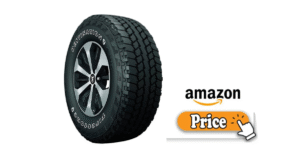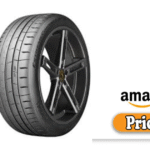Tires aren’t just a purchase, they’re an investment in your safety, comfort, and vehicle performance. Among the many tire brands on the market, Firestone Tires consistently stands out for offering a blend of affordability and reliability.
But if you’re asking, “What do Firestone tires cost?” or wondering whether they’re worth the price, you’re not alone. This guide is for smart shoppers who want honest, detailed insights into Firestone tire pricing, design, build quality, and real-world performance.
We’ll break down what you get for the price, what Firestone does well, where it falls short, and how it compares to alternatives. Let’s explore what your money gets you when you buy Firestone tires.
What I Like About Firestone Tires
Firestone is a trusted brand with more than a century of experience in the tire industry. It’s now part of the Bridgestone Group, which helps it leverage advanced technology while keeping prices competitive. Here’s what stands out:
1. Excellent Value for Money
One of the biggest selling points is the affordable price range across Firestone’s tire lineup. You get dependable performance without premium-brand pricing.
2. Strong All-Season Performance
Many Firestone tires, especially the Firestone WeatherGrip and All Season, offer dependable traction in dry, wet, and light snow conditions.
3. Solid Warranty Coverage
Most Firestone tires come with a 50,000 to 70,000-mile treadwear warranty, giving peace of mind that you’re covered for the long haul.
4. Wide Availability
You can find Firestone tires at countless dealerships, tire chains, and online retailers, and often at competitive or discounted prices.
5. Part of Bridgestone’s Innovation Ecosystem
Thanks to its parent company, Bridgestone, Firestone has access to advanced rubber compounds and tread technologies, usually reserved for more premium lines.
What Could Be Better
No tire is perfect, and Firestone has a few drawbacks depending on your driving habits and expectations.
1. Not Ideal for High-Performance Driving
If you’re driving a sports car or crave ultra-responsive handling, Firestone might not meet your performance needs. Their UHP offerings are limited.
2. Tire Noise on Some Models
Several Firestone all-season tires tend to get noisier over time, particularly when they’re halfway through their tread life.
3. Wet Traction in Budget Lines
Entry-level tires like the Firestone All Season can sometimes underperform in heavy rain or wet braking scenarios compared to premium brands. 👉🏿👉🏻 Check the Latest Price and Offer at Amazon 👈🏻👈🏿
👉🏿👉🏻 Check the Latest Price and Offer at Amazon 👈🏻👈🏿
My Personal Experience with Firestone Tires
I’ve owned three different vehicles over the years that came equipped or were later fitted with Firestone tires. Here’s my honest take.
1. Firestone Destination LE3 (SUV)
These tires were installed on my midsize SUV. I noticed confident dry and wet handling, and they felt smooth on highways. After 20,000 miles, the treadwear was minimal. For an affordable SUV tire, it was a great investment.
2. Firestone WeatherGrip (Sedan)
I replaced a set of worn-out all-seasons with the WeatherGrip, which is 3PMSF-rated for winter driving. I drove it through a mild snowstorm and had zero traction issues. It’s a real standout for year-round performance on a budget.
3. Firestone Champion Fuel Fighter
On a hybrid, I opted for these to boost fuel economy. While not the quietest tires I’ve used, they delivered noticeable MPG improvement over OEMs.
In all cases, I found Firestone tires to be dependable, affordable, and aligned with their advertised features.
Design Philosophy of Firestone Tires
Firestone focuses on a balance between performance, affordability, safety, and durability. Their design is targeted at the everyday driver, not the racetrack.
Key Design Priorities:
- All-Season Versatility: Many tires in their lineup are designed to handle rain, light snow, and dry roads with equal competence.
- Comfort-Focused Tread Patterns: Designed to reduce vibration and improve ride smoothness.
- Fuel Efficiency: The Champion Fuel Fighter uses a low rolling resistance compound to help save gas.
- Siped Tread Blocks: For better grip in wet conditions and improved snow traction in all-weather tires.
Firestone doesn’t try to be flashy; instead, it offers solid, practical engineering that delivers where it counts: the everyday road.
Performance: On the Road, Track & Trail
1. Dry Road Performance
Firestone tires hold their own in dry conditions. Cornering stability, steering response, and braking are all above average for the price point, especially with models like the Firehawk AS V2.
2. Wet Traction
Wet performance varies. The WeatherGrip handles rain and slush confidently. But entry-level tires like the All Season might hydroplane if pushed too hard.
3. Winter Performance
Firestone’s winter-rated tires, such as the Winterforce 2 and WeatherGrip, are 3PMSF-certified and perform well in snow and icy conditions far better than a typical all-season tire.
4. Ride Comfort & Noise
Firestone strikes a good balance between comfort and road feedback. However, tire noise can creep in around the 15,000–25,000 mile mark, especially on older pavement.
5. Longevity
With warranties reaching up to 70,000 miles, Firestone tires are built for long service life. Users frequently report getting close to the full rated mileage.
Build Quality & Materials
Firestone tires are built under the Bridgestone Group’s global manufacturing standards, which are among the highest in the industry.
Materials & Construction:
- High-Silica Compounds for wet traction
- Steel Belts + Polyester Cord Body Plies for strength
- Noise Reduction Ribs in higher-end touring models
- 3D Full-Depth Sipes on snow-rated tires
Where Are Firestone Tires Made?
Firestone has manufacturing plants across the U.S. and internationally. Major U.S. locations include:
- Wilson, North Carolina
- Aiken County, South Carolina
- Des Moines, Iowa
- Bloomington, Illinois
These plants are ISO-certified and follow rigorous quality control standards.
Firestone Tires Price: Full Breakdown
Now let’s talk dollars. Here’s what you can expect to pay for popular Firestone tires, depending on size and retailer.
| Tire Model | Vehicle Type | Price Range (Per Tire) | Treadwear Warranty |
| Firestone All Season | Passenger cars | $75 – $110 | 55,000 miles |
| Firestone WeatherGrip | Sedans/Crossovers | $110 – $160 | 65,000 miles |
| Firestone Destination LE3 | SUVs/Trucks | $130 – $180 | 70,000 miles |
| Firestone Firehawk AS V2 | Sport Sedans | $125 – $170 | 50,000 miles |
| Firestone Champion Fuel Fighter | Compact/Hybrid Cars | $100 – $150 | 70,000 miles |
| Firestone Winterforce 2 | Winter Tire | $95 – $145 | None (Winter tires often lack mileage warranties) |
Tip: Prices can vary based on tire size, speed rating, and seasonal demand. Always check multiple retailers and watch for promotions or rebates.
Alternative Tire Options
If you’re exploring the market, here are a few alternatives that compare well with Firestone in terms of price and performance:
1. General Tire
Known for affordable, high-mileage tires. The Altimax RT43 is a strong competitor to the Firestone All-Season.
2. Falken Tires
Another mid-tier brand with strong all-terrain and performance options. Falken Ziex ZE960 offers excellent wet traction.
3. Kumho Tires
Great value brand from Korea, offering solid all-season and touring tires at budget-friendly prices.
4. Cooper Tires
An American brand that offers similar pricing and longer warranties, especially on SUV and truck tires.
Final Thought: Is Firestone Worth the Price?
So, let’s bring it all together: Are Firestone tires worth the money?
Absolutely if you’re looking for dependable, affordable tires with solid all-around performance.
You’re not paying for racing pedigree or exotic materials. You’re paying for durable, practical engineering that meets the needs of daily driving without hurting your wallet.
Whether you’re a commuter, road tripper, or light adventurer, Firestone tires provide good value per mile. Just be mindful of which model you choose, and you’ll likely be satisfied with your investment.
Read More: How Are Lexani Tires
FAQs: Firestone Tires Price
1. Are Firestone tires considered affordable?
Yes, Firestone tires are mid-tier in pricing, more affordable than Michelin or Continental, but slightly above budget brands like Ironman or Douglas.
2. What’s the average price for a Firestone tire?
Depending on the model and size, most Firestone tires range from $90 to $170 per tire. Specialty or oversized tires may be higher.
3. Do Firestone tires come with warranties?
Yes. Most come with 50,000 to 70,000-mile warranties, with some performance and winter tires excluded.
4. How long do Firestone tires last?
With proper maintenance, Firestone tires typically last 40,000 to 70,000 miles, depending on the model and driving conditions.
5. Are Firestone tires made in the USA?
Yes, many are. Firestone operates manufacturing plants in Illinois, Iowa, South Carolina, and North Carolina, among others.
6. Can I finance Firestone tires?
Yes. Many Firestone dealers and third-party retailers offer payment plans or tire financing options, especially for purchases over $500.
7. Are Firestone tires good for snow?
Ye particularly the WeatherGrip and Winterforce 2 models, which are Three-Peak Mountain Snowflake rated for winter use.



